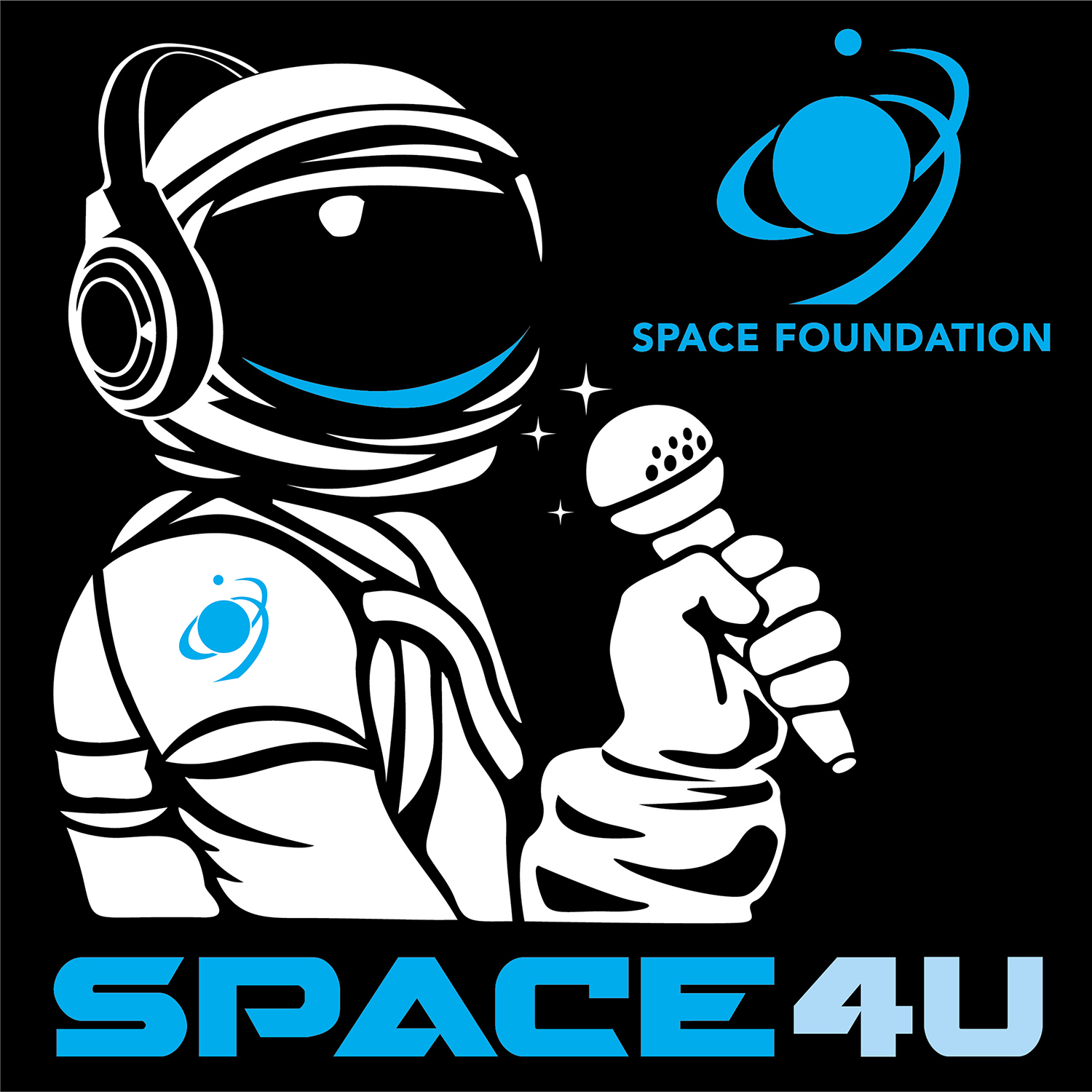Episodes
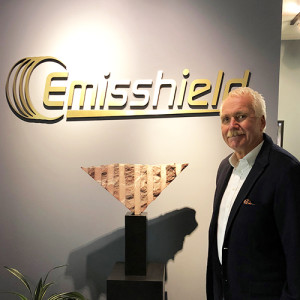
Wednesday Nov 18, 2020
John Olver – Emisshield, Inc.
Wednesday Nov 18, 2020
Wednesday Nov 18, 2020
In this episode:
We meet Dr. John Olver, President, CEO, and founder of Emisshield Incorporated, located in Blacksburg, Virginia. Dr. Olver has extensive experience working in the engineering, environmental, chemistry, and physics fields, and has more than 20 patents and/or patent applications in numerous industries.
In our conversation, Dr. Olver discusses how emissivity ― the ability to radiate ― inspired him and his team to build upon an existing technology developed by NASA for heatshields in the X-33 and X-34 programs. His company, Emisshield, uses this protective ceramic coating concept to make existing materials more thermally efficient across multiple commercial platforms, including power generation, aerospace, and even textiles. John also explains the company’s two priorities while advancing the technology: Keeping the concept environmentally friendly, and simple enough to be applied by everyday hardware store tools.
“We’re enhancing thermal performance, be it heating or cooling of any piece of material,” Olver says. “What we’re really doing is taking the technology from NASA and making composite materials and structures that enhance cooling and/or heating up for an industrial process, or everyday use in clothing, or anything like that.”
To learn more about Emisshield visit http://www.emisshield.com.
Introductory and closing music: Paint the Sky by Hans Atom © copyright 2015 Licensed under a Creative Commons Attribution (3.0) license. http://dig.ccmixter.org/files/hansatom/50718 Ft: Miss Judged
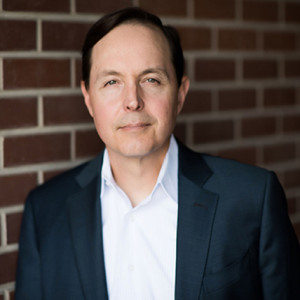
Wednesday Nov 04, 2020
Dylan Taylor – Voyager Space Holdings & Space for Humanity
Wednesday Nov 04, 2020
Wednesday Nov 04, 2020
In this episode:
We meet Dylan Taylor, who is an active pioneer in the space exploration industry as a CEO, investor, thought leader, and futurist. Currently, Dylan serves as Chairman & CEO of Voyager Space Holdings, a multinational space holding firm that acquires and integrates leading space exploration enterprises globally. He previously served as a director for Fortune 500 company UMB Bank and is the former Global President of Colliers International. Dylan is also the founder and board chairman of the nonprofit organization Space for Humanity, and a cofounding patron of the Commercial Spaceflight Federation.
In this episode, Dylan discusses what inspired him to shift his professional focus from banking and real estate to financing space exploration, his thoughts on how commercial space and government agencies can harmoniously complement each other, which space initiatives have the best chance of being realized in the near future, and shares Voyager’s ethos for acquisitions. He gives what he believes are realistic timelines for humans returning to the Moon and getting boots on the ground on Mars, and also shares his reasons behind founding Space for Humanity.
In describing Space for Humanity’s mission and criteria for selecting the citizen astronauts they intend to send to space via commercial space flights, Taylor says, “That narrative can be, look at these amazing kinda ‘everyday citizens’ that are committed to going to space, coming back, and the covenant is: ‘We’ll send you, no cost to you — but when you come back, you need to impact the world in a positive way.’ So, it’s sort of a fellowship, if you will.”
To learn more about Voyager Space Holdings, visit https://voyagerspaceholdings.com.
Note: This podcast was recorded on May 19, 2020, predating the successful SpaceX/NASA Crew Dragon Demo-2 launch (originally slated for May 27, 2020, actually launched on May 30, 2020), which is why it is referred to here in future tense and as occurring on a different date. This recording also refers to a lack of mask wearing in Colorado which predates the statewide mandatory mask order instituted by Governor Jared Polis on July 16, 2020.
Introductory and closing music: Paint the Sky by Hans Atom (c) copyright 2015 Licensed under a Creative Commons Attribution (3.0) license. http://dig.ccmixter.org/files/hansatom/50718 Ft: Miss Judged
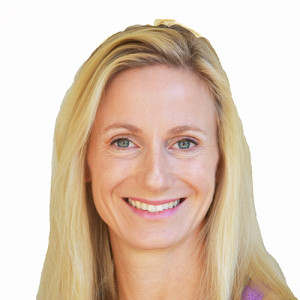
Tuesday Oct 20, 2020
Katharine Forth – Zibrio
Tuesday Oct 20, 2020
Tuesday Oct 20, 2020
In this episode:
We meet Dr. Katharine Forth, CEO of Zibrio, the creator of the SmartScale for balance. She earned a doctorate in motor control and has conducted a postdoctoral fellowship at NASA. Katey is also a world-champion athlete, and as an expert in postural stability, she has created award-winning balance training programs for older adults.
In this conversation, Katey details the difference between posture and postural control, emphasizing that balance is one of the key indicators of health — and therefore important to everyone, no matter their age group. She also explains how technology used for NASA astronauts was adapted to create this new way to measure balance in earthbound individuals.
Prior to the introduction of the Zibrio SmartScale, without an objective way of measuring balance, individuals had to wait until they experienced a fall before addressing the issue. In pointing out how important balance is to wellbeing, Katey shares some startling statistics, warning that, “Falling down is a very big issue. It’s the leading cause of trauma injury and trauma death. And that’s across any ages.”
It was Katey’s insights from working with astronauts in microgravity that led her to create a balance scale that measures postural stability. She says, “Rather than just keeping the technology that we’d invented just for astronauts, we wanted to save the world from falling down. So that became the mission and the true genesis of Zibrio.”
To learn more about Zibrio SmartScales, visit Zibrio.com.
Introductory and closing music: Paint the Sky by Hans Atom © copyright 2015, licensed under a Creative Commons Attribution (3.0) license. http://dig.ccmixter.org/files/hansatom/50718 Ft: Miss Judged
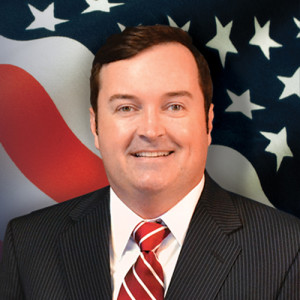
Wednesday Oct 07, 2020
Steve Howard – Spaceport Camden
Wednesday Oct 07, 2020
Wednesday Oct 07, 2020
In this episode:
We meet Steve Howard, County Administrator of Camden County, Georgia, and project lead for Spaceport Camden, currently in development. As project lead, Steve is working to realize Spaceport Camden’s mission of developing a world-class spaceport through a public-private partnership that will establish Camden County as the commercial space center of the United States. Howard also sits on the board of directors for the Commercial Spaceflight Federation.
In our conversation, Steve explains why Camden County is a prime location for a commercial spaceport, the area’s space heritage dating back to the 1960s, how the commercial sector is driving the need for a spaceport like this, and the beneficial assets this particular geographic location has to offer. He also discusses some of the hurdles involved in establishing a spaceport, how the region has embraced the project, how it will change the state, and what he foresees for future of the spaceport in five to ten years’ time.
In detailing what sets Spaceport Camden apart from government-run launch facilities, and the importance of having spaceports available solely to commercial space companies, Steve says, “What Georgia can offer is a clean slate — where the appropriate requirements of NASA and the military will never impact the commercial schedule.”
To learn more about Spaceport Camden, visit https://spaceportcamden.us.
Introductory and closing music: Paint the Sky by Hans Atom © copyright 2015 Licensed under a Creative Commons Attribution (3.0) license. http://dig.ccmixter.org/files/hansatom/50718 Ft: Miss Judged
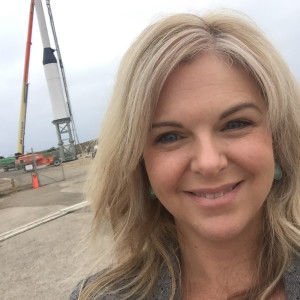
Wednesday Sep 30, 2020
Sean Wilson – Northrop Grumman Space Systems
Wednesday Sep 30, 2020
Wednesday Sep 30, 2020
In this episode:
We meet Sean Wilson, Director of Media and Public Relations at Northrop Grumman Space Systems. Starting her career as an enlisted Satellite Systems Operator for the U.S. Air Force, Sean has since held a number of different roles in space communications, including stints as a Communications Analyst and Astronaut Instructor at Futron Corporation, a Public Relations Specialist at NASA Johnson Space Center, and Director of Corporate Communications at Orbital ATK. In her current role at Northrop Grumman Space Systems, she’s a big part of shaping the company’s messaging and strategies for communicating to the public, company shareholders, and media.
In our conversation, Wilson discusses how her career path led her to specialize in communications, the time she spent as an astronaut instructor, her approach to simplifying industry jargon into consumable communications, how her team coaches high-level executives to speak to the public, and the components of communications plans for launches and missions. She also explains how the role of social media has evolved in the PR arena, the most emotionally taxing events she has had to field as a professional communicator, and the children’s book she authored.
In describing how she got her earlier job with NASA, Sean says, “I spammed, faxed, and snail-mailed, and barraged every contractor within the greater Houston area that had anything remotely to do with NASA, and I think I finally broke one down and they said, ‘Please, if you’ll stop emailing us, we’ll hire you!’”
To learn more about Northrop Grumman, visit northropgrumman.com.
Introductory and closing music: Paint the Sky by Hans Atom © copyright 2015 Licensed under a Creative Commons Attribution (3.0) license. http://dig.ccmixter.org/files/hansatom/50718 Ft: Miss Judged
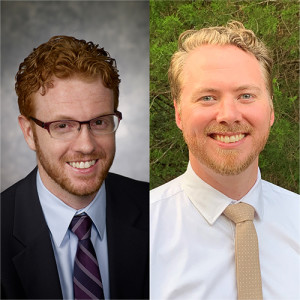
Wednesday Sep 23, 2020
Robert Gregg & Toby Elery — Robotic Prosthesis Built with ISS Motors
Wednesday Sep 23, 2020
Wednesday Sep 23, 2020
In this episode:
We meet Drs. Robert Gregg and Toby Elery, who are part of a team that has designed an improved robotic prosthesis, produced using a motor originally designed for use on the International Space Station (ISS).
Dr. Gregg is an Associate Professor of Electrical and Computer Engineering and Robotics at the University of Michigan in Ann Arbor. He earned a Bachelor of Science in electrical engineering and computer sciences from the University of California, Berkeley, and then subsequent masters and doctoral degrees in electrical and computer engineering from the University of Illinois at Urbana-Champaign. He joined the University of Michigan as an Associate Professor of Electrical and Computer Engineering, and the Robotics Institute, in fall 2019.
Dr. Elery is a mechanical engineer and researcher based in Dallas, Texas, who earned his PhD in Mechanical Engineering from the University of Texas at Dallas in the spring of 2020. Up until April of this year, and for nearly six years prior, he was a PhD Graduate Research Assistant at the university. He's worked on a host of robotics projects, has served as a mentor for undergraduate projects, and has also disseminated his research in the field via several publications and presentations.
In this conversation, our guests discuss how the idea came about to produce a better robotic prosthesis, why a motor produced for the ISS was chosen for their design, how their prosthesis lessens the burden on wearers, which wearers will benefit from it the most, the testing that has been performed so far, and also explain how the force from the residual limb actually charges the battery while the prosthesis is in use.
Describing how an ISS motor was chosen for their design, Elery explains that it was among those with “the highest torque density, which means it can produce a lot of force in a very small package, which was really useful for our application. So, we were able to get a whole lot of torque — a whole lot of force out of it, in a really small volume.”
To learn more about the prosthesis designed by Drs. Gregg and Elery, visit https://gregg.engin.umich.edu.
Introductory and closing music: Paint the Sky by Hans Atom © copyright 2015 Licensed under a Creative Commons Attribution (3.0) license. http://dig.ccmixter.org/files/hansatom/50718 Ft: Miss Judged
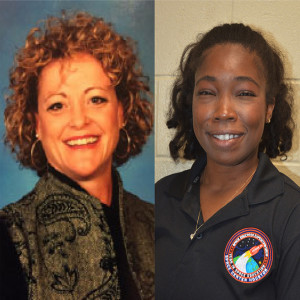
Wednesday Sep 09, 2020
Rebekah Hyatt and Adlena Jacobs — SystemsGo
Wednesday Sep 09, 2020
Wednesday Sep 09, 2020
In this episode:
We meet Rebekah Hyatt, a master educator who is Program Director for SystemsGo, an education nonprofit solely focused on providing STEM curriculum programs. Prior to joining SystemsGo, she taught high school for 15 years in the Dallas area, and during her last seven years in the classroom she taught the SystemsGo curriculum.
We also meet Adlena Jacobs, another master educator who holds a Bachelor of Science degree in physics and math, and a master’s degree in Higher Education Administration. She has been teaching for 12 years and is currently the STEM Coordinator at Sunnyvale High School in Sunnyvale, Texas.
In this conversation, both guests express their passion for preparing the next generation to join the workforce. Rebekah talks about what inspired her to join SystemsGo, the overall mission of the program, and some of the benefits she has seen over the years. As a teacher who is new to the program, Adlena brings a fresh perspective to the training process, has a newcomer’s enthusiasm for bringing it to her students, and shares how she anticipates they will grow from the program.
Both explain that failure is an important aspect of the program, as it leads to growth for the students. Says Rebekah, “We want to produce people that are equipped with skills to walk through the fear of the unknown. Because the fear of the unknown can be totally crippling to many people.”
Adlena herself admits that she had to struggle through her own failure during the teacher training but knows this only enhances her ability to relate to her students and guide them. She says, “Even though you’re failing, keep going — you will get there.”
To learn more about SystemsGo visit systemsgo.org.
Introductory and closing music: Paint the Sky by Hans Atom (c) copyright 2015 Licensed under a Creative Commons Attribution (3.0) license. http://dig.ccmixter.org/files/hansatom/50718 Ft: Miss Judged
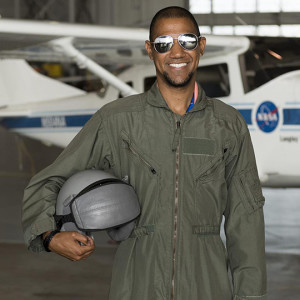
Wednesday Sep 02, 2020
Aaron Shepard – NASA Robotics Intern & Founder of Cogito
Wednesday Sep 02, 2020
Wednesday Sep 02, 2020
In this episode:
We meet Aaron Shepard, an In Space Assembly Robotics Intern at NASA Langley, and a Robotics Research Assistant at Clemson University College of Engineering and Science. Aaron also works at R&D Engineering Co-Op, Itron, Inc., and is the Founder/CEO of Cogito, a company dedicated to inspiring young people through STEM outreach.
He is affiliated with the Mars Generation, an international nonprofit organization that works to excite people of all ages about science, technology, engineering, mathematics, and human space exploration, and is currently a member of the organization's Student Space Ambassador Leadership Board, where he serves as chair of the outreach committee. He works as a tutor and mentor for the PEER & WISE program at Clemson, which helps to give underrepresented students studying STEM subjects the resources and tools they need to follow their dreams of STEM and space, and he has also given a TEDx talk entitled Make America Space Again.
In this conversation Aaron talks about what inspired him to switch from his initial career path of medicine to robotics, gives details on how he got into his internship at NASA, shares his thoughts on the future of robots in space exploration, touches on his company Cogito, describes his favorite robot project that he’s currently working on, and explains how he thinks international cooperation will help achieve our goals in space.
In describing how robots will eventually build human habitats on other planets, Aaron says, “I’d say we’re within a 20-year range of having fully autonomous robot construction crew in space ... I think that’s possible.”
To learn more about Aaron’s new company Cogito, visit cogitobrains.com.
Note: This episode refers to the successful July 30, 2020 launch of the Perseverance Mars Rover and Ingenuity helicopter in future tense because the podcast was recorded on July 23, 2020.
Introductory and closing music: Paint the Sky by Hans Atom (c) copyright 2015 Licensed under a Creative Commons Attribution (3.0) license. http://dig.ccmixter.org/files/hansatom/50718 Ft: Miss Judged
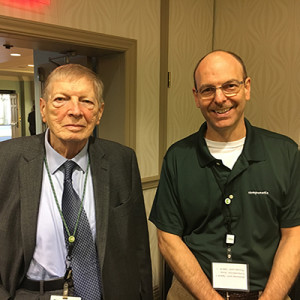
Wednesday Aug 26, 2020
Giorgio Coraluppi and Michael Hockenberry — Compunetix
Wednesday Aug 26, 2020
Wednesday Aug 26, 2020
In this episode:
We meet Dr. Giorgio Coraluppi, President of Compunetix, Inc. and subsidiaries, and Michael Hockenberry, Vice President and Federal Systems Division Manager of Compunetix, Inc.
In 1987, Compunetix won a contract to deliver a digital voice switching system for NASA Goddard that would accommodate the agency’s range of communication needs. At the time, the agency was using an analog system requiring the manual switching of cables. Compunetix integrated their patented algorithm into the NASA infrastructure, developing two new digital systems for voice switching and voice distribution — allowing software-enabled switching, and eliminating the need for manual switching.
By 1992, the new 4,000-port system had been installed, and eventually entirely replaced NASA’s previous system. Following that, Compunetix developed a commercial version of the technology, and today, the Compunetix bridge hardware is used by nearly every major conference call provider. The technology was inducted into the Space Technology Hall of Fame in 2020.
Dr. Giorgio Coraluppi received his doctorate in electrical engineering from the Politecnico di Milano in 1958. He served in the Italian Armed Forces, worked for the Electronic Research Laboratory of Olivetti, American Optical Company, and Carnegie-Mellon University in Pittsburgh, Pennsylvania. Since founding Compunetix, Inc. in 1968, he has been president of the company and its subsidiaries.
Michael Hockenberry has been an integral part of Compunetix for over 32 years. He was hired in 1988 as a design engineer on the NASA Goddard Voice Switching System (VSS). He also developed the conferencing module for the company’s first commercial conferencing systems, the CONTEX 240 and 480. He holds a Bachelor of Science degree in Electrical Engineering Technology from Pennsylvania State University.
In this conversation, Dr. Coraluppi and Hockenberry discuss the company’s guiding philosophy, their experiences at NASA working on the VSS, the role that Compunetix played in Command Center communications following the 9/11 tragedies, and the hardware they developed for IBM’s “Deep Blue,” the computer that challenged world chess champion Garry Kasparov. In recalling his experiences working on the VSS at NASA as a young engineer, Hockenberry says, “I got to see images coming down from Hubble that nobody else in the world got to see yet, just by being there at that time. It was a very interesting environment.”
To learn more about Compunetix, visit compunetix.com.
Introductory and closing music: Paint the Sky by Hans Atom (c) copyright 2015 Licensed under a Creative Commons Attribution (3.0) license. http://dig.ccmixter.org/files/hansatom/50718 Ft: Miss Judged
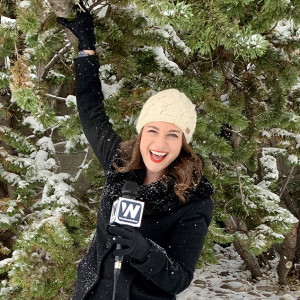
Wednesday Aug 12, 2020
Meredith Garofalo – WeatherNation
Wednesday Aug 12, 2020
Wednesday Aug 12, 2020
In this episode:
We meet Meredith Garofalo, an award-winning Certified Broadcast Meteorologist who is part of the team at the WeatherNation TV network. She’s also co-chair of the AMS Station Scientist Committee, which focuses on raising greater awareness and outreach to promote science education for the community. She has earned a bachelor's degree in Meteorology from Valparaiso University, and a Seal of Approval from the American Meteorological Society.
In this conversation, Meredith talks about what inspired her to become a meteorologist, how she feels that space is important to her profession, and some of the most challenging aspects of forecasting weather. She also shares how important mentors were in inspiring her to follow her career path, the ways that space weather can affect our weather here on Earth, and she recalls her on-location coverage of severe weather events like Hurricane Harvey and Tropical Storm Debby.
Discussing the common misconceptions that people have about meteorologists, Meredith says, “Yes, sometimes we’re not going to be right. And a lot of times when we’re not right, we’ll be able to go back and look at what happened and be able to explain, and there are going to be those times where maybe we can’t explain, because it’s an area that we’re still learning stuff from daily.”
To learn more about WeatherNation visit weathernationtv.com.
Introductory and closing music: Paint the Sky by Hans Atom (c) copyright 2015 Licensed under a Creative Commons Attribution (3.0) license. http://dig.ccmixter.org/files/hansatom/50718 Ft: Miss Judged

